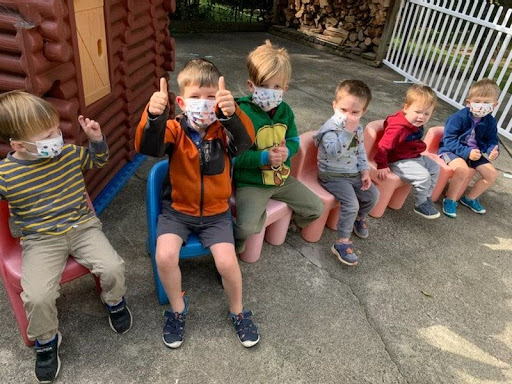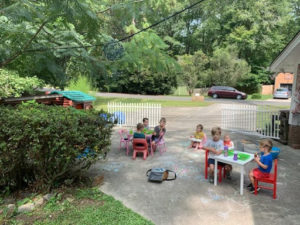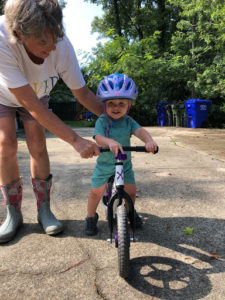
This article is the third in a series of enterprise stories about individuals or groups of people in the Chapel Hill-Carrboro community who have been acutely affected by the coronavirus pandemic. To read more articles like this one, visit the series’ introductory page or click the “Spotlight” tab above.
Out on her lawn sits Deborah Gilgor as she photographs the eight kids she cares for five days a week—one of her favorite parts of her job. Later, she sends the pictures to the parents, providing them a glimpse of their children’s daily activities and an assurance of their well-being.
Despite having found their footing now, it was only about a year ago that Gilgor and her life partner, Trystlynn Barber, were struggling to get by. Deborah’s Day School—the home daycare Gilgor and Barber have run for 35 years—saw its student body fall to just three, as parents pulled their children out of the daycare en masse.
Parents were fearful of the dangers of COVID-19, and so was Gilgor.
“I remember waking up multiple times from nightmares where kids were getting sick,” she said. “It was a very heavy burden, knowing COVID could get us anywhere.”
Gilgor said she was barely able to pay her rent and was ignoring bills that she could not afford to pay. For months, she and her partner were living off of food from churches and food banks.
During the pandemic, some daycares have learned to improvise, finding ways to keep their businesses open and remain afloat financially while ensuring children do not contract the coronavirus. Slowly and steadily, Gilgor has been able to establish a new system—one that has kept her children safe while providing busy parents with necessary child care.

Creating a safe environment
After shutting her doors for two weeks, giving her time to educate herself on COVID-19 safety, Gilgor reopened the daycare and moved her entire system outside—even during the winter months—creating a makeshift classroom in her carport and driveway.
“Everything was outside,” Gilgor said. “We brought the sofa out into the carport, and we moved a TV there to play little videos that kept the kids occupied while we were trying to break down and set up for lunch.”
Gilgor made many other adjustments to the daycare’s operations. They changed the closing time to an hour earlier—now 4:30 p.m.—so she and her partner could deep-clean the area for the next day. She said cleaning isn’t too expensive because state government programs assist them with cleaning supplies.
Gilgor also enforced policies suggested by the state: making children and parents who come onto the premises wear masks, taking the temperature of attendees and making sure all students wash their hands.
Gilgor’s concern was warranted, as some child care centers proved to be hotspots for coronavirus transmission. In the last two weeks of March, almost 3,000 people tested positive for COVID-19 in Wake County, and a cluster report released March 31 found that 230 of these cases could be traced back to at least 26 schools and daycare centers in the area.
Deborah’s Day School, however, has yet to see a single COVID-19 case.
“The entire time we were working, no kid got a cold or a cough or a sniffle or a runny nose,” Gilgor said.
Welcoming families back
Deborah’s Day School’s new procedure helped many parents gain confidence in sending their children back to Gilgor’s care.
Dan and Ellen Earixson removed their two-year-old son Sorren from the daycare in March 2020, just as the nationwide pandemic began.
“When Deborah shut down, we were like, okay, coronavirus is more serious than led on,” Dan Earixson said. “We kept Sorren out for a little while when she did that. Also, we were both working virtually, so the transition wasn’t difficult, at first.”
As the summer rolled around, the two found it difficult balancing work and child care. Dan Earixson is a graduate student at UNC-Chapel Hill, while Ellen Earixson works as a first-grade teacher in Pittsboro. Eventually, they agreed the time was right to re-enroll Sorren at Deborah’s Day School.
“I think it took a lot of pressure off our work once we decided to make the decision for him to go back to school,” Ellen Earixson said.
Gilgor’s concern for safety helped assure the Earixsons that Sorren would be safe, giving them the confidence to send him into a beneficial social environment at a time when all other options had seemed to vanish.
“[Gilgor] has always been careful with who she’s introducing to him, whether it’s a new student or another adult. They also clean every night, and, for a while, they were doing their best to keep some sort of distance between the kids,” Ellen Earixson said.
“All of this affects kids—all of it”
Gilgor believes the service of child care is a necessity, and she is nervous about the effects younger children will experience as a result of lacking the social and educational benefits of a daycare environment.
“All of this affects the kids—all of it,” Gilgor said. “We have no idea what the fallout is going to be for about a decade. What happened to infants in the pandemic? What about children who had care, but had child care providers who were masked the whole time? In ten years, you’re going to have a group of kids that will probably be less social, more narcissistic and more distractible.”

It seems that the federal government has these concerns as well. The Biden-Harris administration announced on April 15 the release of $39 billion to counter the “child care crisis caused by COVID-19.” The money, which is a part of the administration’s American Rescue Plan, went to states, territories and tribes to help child care providers remain open for business.
Deborah’s Day School applied for assistance from the American Rescue Plan, but has yet to receive confirmation as to whether it qualifies or not.
“Early childhood education needs as much financial assistance as possible,” Gilgor said. “Not only to offset the deficits COVID brought, but to make quality child care affordable to all.”











